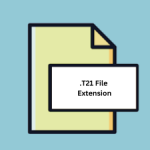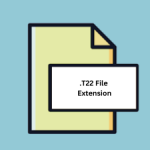.MPS File Extension

Mathematical Programming System File
| Developer | IBM |
| Popularity | |
| Category | Data Files |
| Format | .MPS |
| Cross Platform | Update Soon |
What is an MPS file?
.MPS file extension holds significant importance. Short for Mathematical Programming System, the .MPS file format serves as a standard format for representing linear programming models and mathematical optimization problems.
These files encapsulate essential data necessary for solving complex optimization problems efficiently.
More Information.
The history of .MPS files intertwine with the evolution of mathematical optimization techniques and software tools.
Initially conceived as a means to streamline the representation and exchange of optimization models, .MPS files served as a foundational element in the development of optimization software ecosystems.
They provided a common language for expressing optimization problems, fostering interoperability and collaboration among researchers and practitioners.
Origin Of This File.
The origin of the .MPS file extension dates back to the development of mathematical programming systems in the mid-20th century.
It emerged as a means to facilitate the interchangeability of optimization problems between various software platforms and solvers.
The standardization of .MPS files streamlined the process of sharing, analyzing, and solving complex optimization problems across different computational environments.
File Structure Technical Specification.
.MPS files follow a structured format designed to represent mathematical optimization problems comprehensively. The file typically consists of several sections, including:
- NAME Section: Specifies the name of the optimization problem.
- ROWS Section: Defines the rows of the problem, representing constraints and objective functions.
- COLUMNS Section: Describes the columns, which correspond to decision variables and their coefficients in the objective function and constraints.
- RHS Section: Contains the right-hand side values of constraints.
- BOUNDS Section: Specifies variable bounds (e.g., lower and upper bounds).
- RANGES Section: Defines ranges for constraint coefficients.
- ENDATA Section: Indicates the end of the data.
The technical specifications of .MPS files are well-documented, ensuring interoperability among different software implementations and solvers. This standardized structure simplifies the process of parsing and processing .MPS files within computational environments.
How to Convert the File?
Converting .MPS files to other formats or vice versa often involves specialized software tools or libraries designed for mathematical optimization. Common conversion methods include:
- Using Optimization Software: Many optimization software packages support importing and exporting .MPS files, allowing users to convert them to formats such as LP, MIP, or mathematical modeling languages like AMPL or GAMS.
- Custom Scripts or Programs: Advanced users may develop custom scripts or programs to parse .MPS files and convert them to alternative formats based on specific requirements or compatibility needs.
Advantages And Disadvantages.
Advantages:
- Interoperability: .MPS files can be exchanged seamlessly between different optimization software and solvers, fostering collaboration and knowledge sharing within the optimization community.
- Compactness: The structured nature of .MPS files allow for the concise representation of complex optimization problems, reducing storage and transmission overhead.
- Accessibility: By adhering to a standardized format, .MPS files are accessible to a wide range of optimization tools and libraries, enhancing the versatility of mathematical modeling workflows.
Disadvantages:
- Limited Expressiveness: While suitable for linear and mixed-integer programming, .MPS files may not fully capture the nuances of more complex optimization problems, such as nonlinear programming or stochastic optimization.
- Parsing Complexity: Parsing and interpreting .MPS files require specialized software or libraries, which may pose challenges for users unfamiliar with the format or lacking appropriate tools.
- Sparse Representation: .MPS files tend to represent sparse matrices, which may result in increased computational overhead when processing dense optimization problems.
How to Open MPS?
Open In Windows
- Use optimization software such as IBM ILOG CPLEX Optimization Studio, Gurobi Optimizer, or Microsoft Excel with appropriate plugins to open and work with .MPS files.
Open In Linux
- Linux users can leverage optimization solvers and modeling tools available for the platform, including GLPK, CBC (Coin-or Branch and Cut), or SCIP (Solving Constraint Integer Programs).
Open In MAC
- Utilize optimization software compatible with MacOS, such as IBM ILOG CPLEX Optimization Studio or open-source alternatives like GLPK (GNU Linear Programming Kit).













